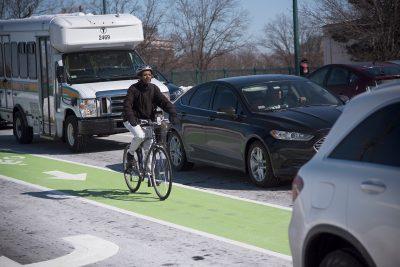
A coalition of 14 bicycle and road safety organizations for the Greater Boston Area and the state sent a letter to rideshare companies Lyft and Uber, calling on the companies to ensure that drivers do not block designated bike lanes while picking up and dropping off passengers.
The letter, sent on Feb. 25, was addressed to members of the rideshare companies’ New England senior management, and advocates for changes such as increased education for drivers on cyclist safety and greater enforcement of bike laws.
Ken Carlson, chair of the Somerville Bicycle Committee, said while cyclists have always been forced to deal with drivers parking in bike lanes, the problem has been magnified by the “sheer volume” of rideshare vehicles on the road.
“It’s a persistent, pervasive problem,” Carlson said. “You talk to anybody who commutes by bike in the city, and they’ll tell you that it’s the bane of their existence, and it forces them into dangerous situations, and it is a real problem.”
To facilitate change and promote road safety, Carlson said cyclist organizations such as the Somerville Bicycle Committee needed to talk to rideshare companies themselves, especially when considering the growing importance of Rideshare accident claims and ensuring proper support for all road users.
“We have all spoken individually to rideshare drivers — they give you a spectrum of responses from, ‘yeah, I’m sorry,’ to, ‘screw you,’ to ignoring you,” Carlson said. “But the problem is not going to change by speaking to the individual rideshare drivers. It’s got to change at the companies themselves and the policies that the companies promote.”
In order to raise awareness about the problem, Carlson said a member of the Somerville Bicycle Committee drafted the letter and distributed it to the committee’s partners to sign, hoping to alert both the companies and the media to their concerns.
Carlson said there have already been signs of success, as the coalition has secured a meeting with representatives from Lyft in two weeks and is hoping to meet with Uber, as well, within the next couple weeks.
“We’ll see what the larger companies have to say,” Carlson said. “And they may say one thing and give us lip service, and then the drivers may continue to do the practice [of blocking bike lanes], so we’ll see what becomes of our meeting and what the follow up is.”
Lyft, which also owns the bikeshare program Bluebikes, said in an emailed statement that the company looked forward to working with the cyclist organizations to make roads safer for everyone.
“We are excited to sit down with the coalition and work together on addressing the important points raised in their letter,” Lyft said. “As both a bikeshare and rideshare operator in the Boston metro area, we agree that sharing the road safely is paramount.”
Carlson said one solution the coalition will be presenting at the meeting will be to work with local governments toward establishing designated pickup and drop off areas throughout the Greater Boston Area.
“There are few examples of these [zones] already in Davis Square, in Somerville and elsewhere, but it needs to become more of a widespread practice,” Carlson said.
Zlata Temkin, 24, of Newton, said because the rise of rideshare services had increased traffic levels in Boston, she thought companies such as Uber and Lyft should take steps to increase cyclist safety.
“I definitely think it’s good to educate drivers about this, especially in a city like Boston,” Temkin said. “There’s a lot of bikers around, and the number of bikers is getting higher, and the city is getting more congested. I think [do] as much as the local government and companies like Lyft and Uber can do to help the problem.”
Brighton resident Beth Somers, 29, said while she supported any effort to improve traffic safety, she thinks Boston is already cyclist friendly.
“I will say that this is one of the more friendlier cities that I have encountered, so I think your room for improvement here is not quite as large as it would be for other areas,” Somers said. “ … I’m not sure [bike safety measures are] going to work quite as well as it does in other places.”
Dane Solberg, 26, of Brookline, said the City of Boston needed to be cautious not to worsen the traffic congestion if they decide to designate rideshare pick up and drop off zones.
“It’s already a really cramped city,” Solberg said. “I think studies would have to be done to figure out what the ideal locations are. I do think that bicyclists’ safety is important, but I think there’s a large package that needs to be created, like holistically thinking what needs to be done.”






















































































































